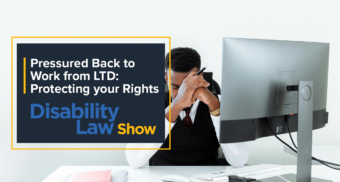LTD Benefits and Addiction: What the Insurer Won’t Tell You | Disability Law Show TV – S7 E20
Episode Summary
LTD BENEFITS AND ADDICTION: WHAT THE INSURER WON’T TELL YOU on Season 7 Episode 20, the Disability Law Show with Disability Lawyer and Partner, James Fireman.
Watch above to discover the steps you must take when the insurance company cuts off or denies your long-term disability claim anywhere in Canada, on the only disability law show on TV and radio in the country.
Episode Notes
Communicating with your disability insurer
I was a pharmacist working for many years until my mental health condition prevented me from doing so. I was approved for LTD for several years. My anxiety would flare up when communicating with my insurer. After some missed calls, despite my email responses, they cut me off. Was this justified?
- Complying with disability policy terms: Claimants should ensure they provide regular updates to their disability insurer to the best of their ability. While insurers can cut off a claimant’s benefits if they have not provided sufficient information, they are also obligated to act in good faith with claimants.
Travelling while on long-term disability
I’ve been on long-term disability for a few years now. My treating psychiatrist mentioned that taking a short trip to see family would significantly help me improve. Should I inform my insurer about my travel plans, or will they view this as an opportunity to cancel my coverage?
- Rights on disability leave: Claimants should be honest with their insurance adjusters if asked about travel plans; however, they are under no obligation to offer information if it is not necessary. Those on leave should continue to follow the recommended advice of their treating medical professionals. Claimants should look at the terms of their disability policy to determine if there are travel limits while receiving benefits.
LTD Benefits and Addiction: What the Insurance Company Won’t Tell You
- Recognized as a disability: Addiction is considered a disability despite the stigma, and those who are unable to work due to addiction are eligible for disability benefits.
- Claims often denied: Claims regarding addiction, much like mental health claims, are often denied by insurance companies. This is largely due to the nature of both types of claims. Claimants should ensure they have the support of a treating medical professional.
- Accepting a denial of benefits: For those suffering from addiction who have had their claim denied, they can still pursue legal action. A denial of benefits does not have to be accepted if a treating doctor supports that an individual cannot work.
Claim denied due to “situational” disability
I was on short-term leave almost a year ago, dealing with anxiety and panic attacks after losing a close friend and working in a toxic environment. It became clear I needed more time to heal. Even though my doctor supported me, my LTD claim was denied – they said my condition was ’situational.’ What can I do?
- Mental health claims: A ‘situational’ disability only occurs in a specific environment due to the nature of the workplace. Some mental health conditions are deemed ‘situational’ by disability insurers despite other factors and the support of a treating medical professional. Generalized conditions are often mistaken for situational.
CPP Disability denial impacts LTD
I have been receiving LTD benefits for almost 3 years due to chronic pain after a back injury. After being told to apply for CPP Disability by my insurer, I was unfortunately denied. What does this mean for continuing LTD payments?
- CPP Disability claims: The test to qualify for CPP Disability is different than that of a typical long-term disability policy, and more difficult. To be eligible for CPP Disability benefits, claimants must have a severe and prolonged disability. Insurers are not entitled to cut off LTD due to a denial of CPP Disability. Approval for CPP Disability can strengthen a long-term disability claim.
PREVIOUS EPISODE: Disability Law Show S7 E19 – Pressured Back to Work from LTD: Protecting your Rights




